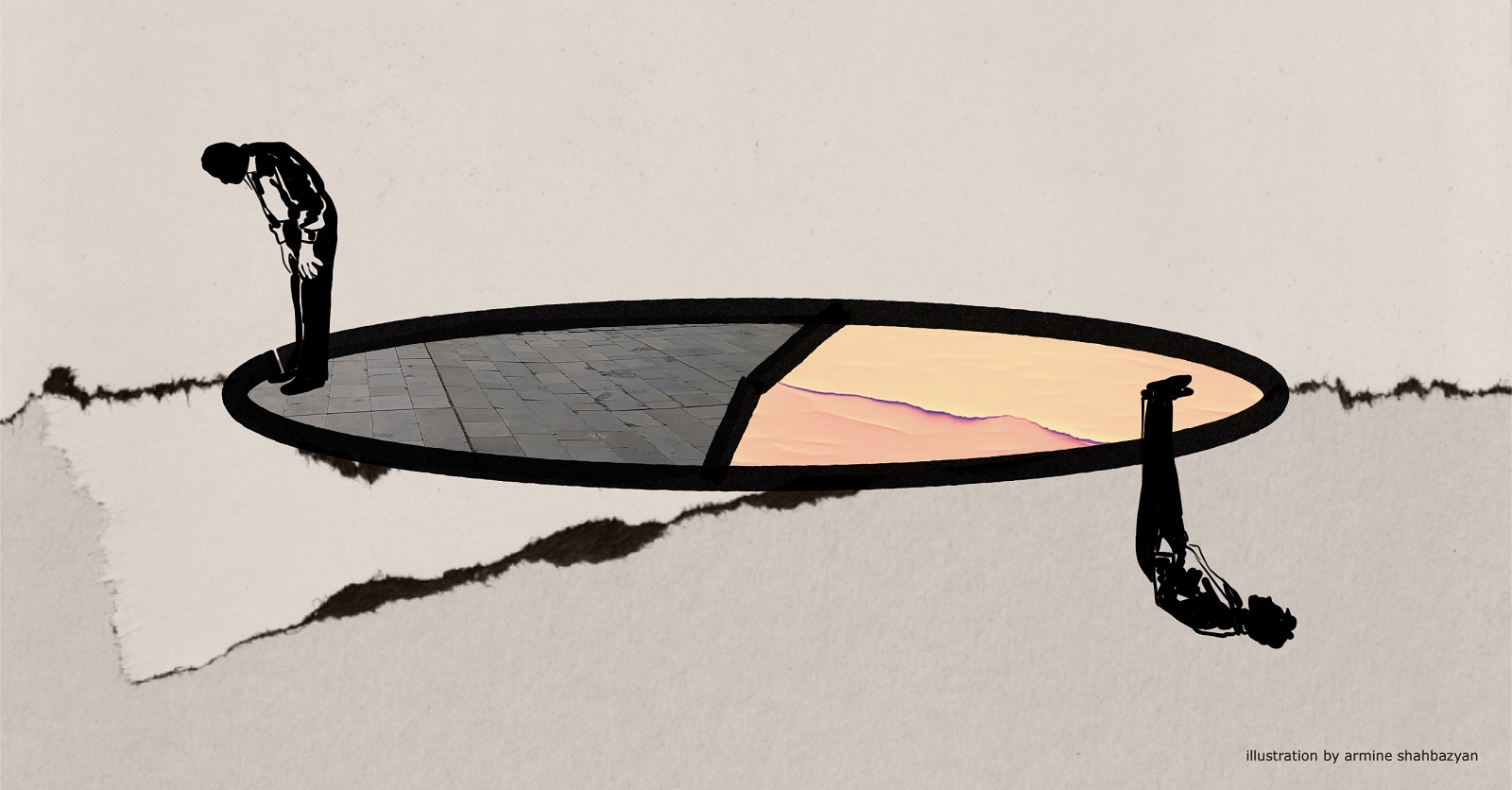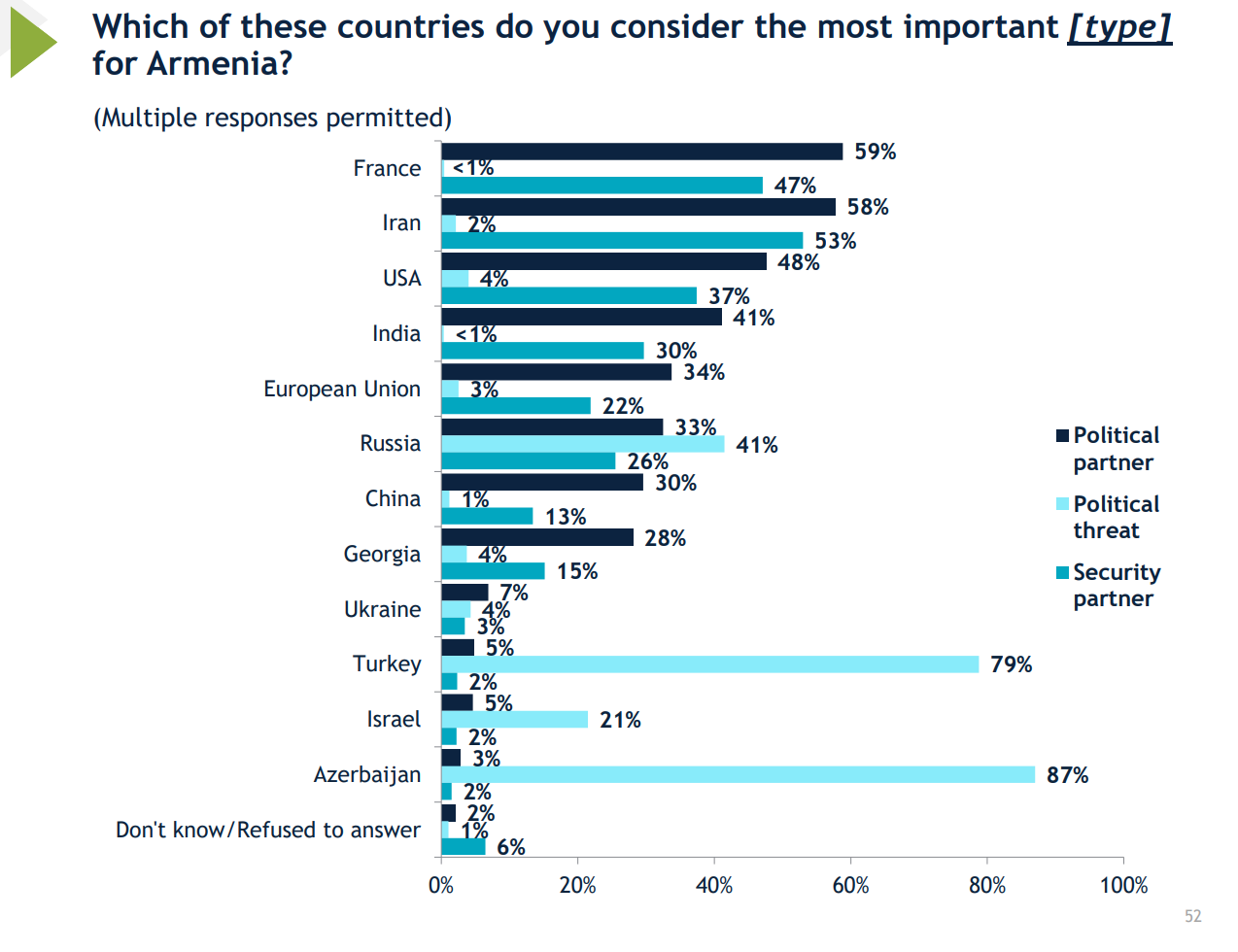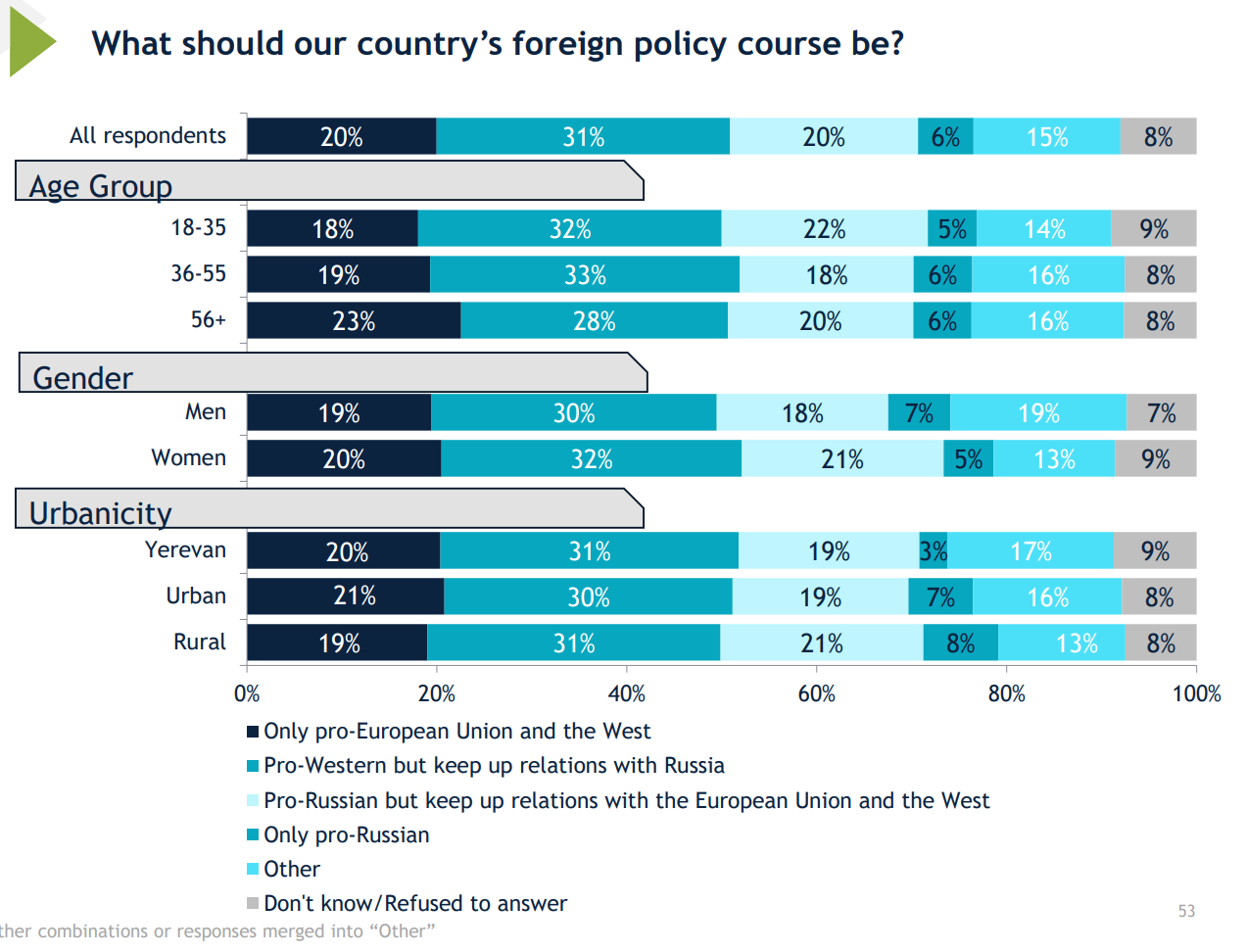
Listen to the article.
The International Republican Institute (IRI) recently released its latest public opinion survey in Armenia, conducted from September 13 to 25. It is extensive in scope and reflects many of the same sentiments observed in the last poll from December 2023, but also reveals additional attitudes held by the Armenian public, especially on foreign policy.
Direction and Problems
The Armenian public remains divided on the country’s direction. Of those polled, 46% said Armenia is heading in the right direction, with 40% saying it is heading in the wrong direction. The 56+ age group and rural residents are most optimistic, with 51% and 52% of each group saying Armenia is on the right track. People in Yerevan (43%), the 18 to 35 age group (43%) and those without a job (41%) are least likely to say the country is on the right path.
Optimism about the country’s future, above 60% in 2019, has fluctuated since the 2020 war, plunging below 40% in 2021 and 2023.
Similar to the last poll conducted in December 2023, a large plurality of respondents (41%) named national security and border issues Armenia’s most important problem, followed by unemployment (14%), cost of living and high prices (10%), poor conditions of schools and poor quality of education (10%).
Respondents named establishment of peace (22%), ensuring Armenia’s security and its borders (19%) and strengthening the army (17%) the three things the Armenian government must achieve in the next six months. Other noteworthy responses were improving social conditions and economic growth and revising foreign policy, both at 14%.
A majority of respondents, at 66%, said they are satisfied with how the Armenian government has handled the crisis of forcibly displaced Armenians from Nagorno-Karabakh (Artsakh), while 27% are dissatisfied. People in Yerevan (60%) are less likely to be satisfied than those in rural areas (73%). Among the dissatisfied, the most frequently cited reason is the government’s perceived failure to provide housing (30%), followed by failure to address unemployment (15%), discriminatory attitude towards refugees, disproportionate distribution of aid, and overall insufficient actions (all three at 14%).
Approval of Government
Approval of the authorities is measured in several questions. For instance, the work of government ministries is rated positively by 41% and negatively by 51%. The approval of the Prime Minister’s office is slightly higher, at 46%, with disapproval at 50%. This has not changed since the December 2023 poll, when approval was 50% and disapproval at 48%. After Pashinyan’s rise to power, the figure consistently stood above 70%, reaching as high as 85%, but collapsed after the 2020 war, hitting a low of 38% in the 2021 and 2023 IRI polls.
At the same time, Pashinyan remains the most trusted politician with 16% of respondents naming him in their two spontaneous responses. But a large majority, 61%, said they do not trust any politician. Pashinyan is followed by Aram Z. Sargsyan, head of the pro-Western Republic Party and Foreign Minister Ararat Mirzoyan at 4% each and parliament speaker Alen Simonyan and former president and opposition leader Robert Kocharyan at 2% each. These numbers have remained the same since December 2023.
Unlike gender, there is significant variation in trust in Pashinyan by age group. Among the youth (ages 18-35), just 7% named Pashinyan as their most trusted politician, which rose to 16% among the 36-55 group, and increased further to 25% among the 56+ group, which now appears to be a key base of support for Pashinyan. Among younger people, a whopping 76% said they do not trust anyone. In Yerevan and other urban areas, trust in Pashinyan stands at 13% and 14%, respectively, but rises to 20% in rural areas. Among those displaced from Nagorno-Karabakh (Artsakh), trust in Pashinyan stands at 2%, Kocharyan at 6% and none at 75%.
Pashinyan’s Civil Contract remains the most popular party, far ahead of all others. When asked which party or alliance they would for if parliamentary elections were held next Sunday, 20% of respondents named the ruling party and another 2% named the non-existing My Step alliance, which was the name of Pashinyan’s parliamentary bloc from 2018 to 2021. This brings the total vote for Pashinyan to 22%.
The parliamentary opposition—Armenia and I Have Honor blocs—led by former presidents Robert Kocharyan and Serzh Sargsyan collectively polled at 7%. In the poll, these appeared separately as the Armenia Alliance (2%), Republican Party (2%), ARF (2%), and “party of Robert Kocharyan” (1%).
Gagik Tsarukyan’s Prosperous Armenia, which has been inactive in recent years, polled at 3%. Aram Z. Sargsyan’s pro-Western Republic party and anti-establishment blogger Vardan Ghukasyan’s Public Voice party, represented in the Yerevan City Council, each polled at 2%.
A healthy majority of respondents, 54%, said they would like to see new parties in future elections with 41% being satisfied with the current choices. There is no variation by gender and age, but there is significant difference by place of residence. At 62%, people in Yerevan are significantly more likely to want new parties than residents of other cities (53%) and rural areas (47%).
The biggest achievements of the Pashinyan government of the past six months are improvement of roads, cited by 12%, army reforms and rearmament (9%), ensuring security and peace and diversification of foreign policy (both at 8%). Its biggest failures are wrong foreign policy and diplomacy (16%), wrong personnel choice and mismanagement (12%), “demarcation, handover of lands, negotiations with Azerbaijan/the surrender of Artsakh” (12%), and lack of border security (9%).
Institutions
IRI asked respondents to rate the work of a number of institutions. As in the previous poll, the Armed Forces received the highest approval, with 64% satisfied with its work compared to 32% who were dissatisfied. Respondents were divided over army leadership, with 49% satisfied vs 45% dissatisfied. The work of the police was rated positively by 61% vs 35% negatively. Courts and parliament continue to be the least popular institutions, with just 32% and 30% approving of their work, respectively.
Opinion on the Armenian Apostolic Church is even divided, with approval at 48% and disapproval at 46%. This may have been impacted by the recent movement spearheaded by senior cleric Archbishop Bagrat Galstanyan of Tavush against the government of Pashinyan.
Friends and Foes
A large section of the poll concerns Armenia’s foreign policy and international relations.
Nearly 95% of respondents rated Armenia’s ties with France and India as good. Ties with southern neighbor Iran were appraised positively by 88%, followed by the United States (82%), northern neighboring Georgia (81%), European Union (80%), and China (77%).
Ties with Israel, Turkey, and Azerbaijan were rated as bad by 61%, 72% and 88% of respondents, respectively. Ties with Ukraine were assessed more positively with 53% rating them as good against 38% saying they are bad.
Ties with ex-ally Russia are now rated badly by nearly two-thirds (63%) of respondents and well by a third (35%). In IRI polls, ties with Russia began their decline after the 2020 war. They went from being rated as good by 93% in 2019 to 70% in May 2021, reaching a turning point in the March 2023 poll, when those describing Yerevan’s ties with Moscow as good and bad stood at 50% and 49%, respectively. In the December poll, numbers had already reversed, with 66% saying Armenia-Russia ties were bad for the first time on record.
The contradictory ties with Russia are reflected in another set of questions. Russia is simultaneously seen as a political and security partner by 33% and 26%, respectively, but a political threat by 41% of respondents. Only Turkey (79%) and Azerbaijan (87%) are perceived as threats by more people.
A majority of respondents, at nearly 60%, see France and Iran as the most important political partner when given the chance to provide multiple responses. The list of perceived allies also includes the U.S. (48%), India (41%), the EU (34%), China (30%), and Georgia (28%).
Iran, at 53%, is seen as Armenia’s most important security partner by more respondents than any other country, including France, 47%, with which Armenia has a high-profile defense partnership. The U.S. and EU are seen as the most important security partners by 37% and 22%, respectively, while India, another key defense partner, stands at 30%.

Foreign Policy Course
For the first time in IRI polls, respondents were asked to identify their preferred foreign policy course for Armenia. They were given four main choices ranging from a pro-Western to a pro-Russian course. The two “hybrid” choices proposed being pro-West/pro-Russia, but “keep up” ties with the other.
A majority, 51% prefer a pro-Western course, whether exclusively or in combination with “keeping up” ties with Moscow. 26% prefer a pro-Russia course, again either exclusively or primarily. 15% said they prefer another choice, presumably a diversified foreign policy that does not align with either Russia or the West, but deepens ties with Armenia’s neighbors Georgia and Iran, the non-Western world, especially India and China.
In a more detailed breakdown, 20% want an exclusively pro-Western course as opposed to 6% who prefer a hard pro-Russia course. 31%, a plurality, prefer a pro-Western course with maintained ties with Russia, while another 20% said they favor a pro-Russia course along with keeping up ties with the West.

There is not much variation by age group or gender, but among Yerevan residents, a pro-Russian course is preferred only by 22% compared with 29% in rural areas. An exclusively pro-Russia course is favored by 8% in rural areas compared to just 3% in Yerevan.
In another question, 58% said they would vote for a potential referendum on Armenia’s prospective EU membership, with only 13% saying they would oppose it. The 56+ age group was most likely to support such a move, at 66% compared with 46% of the 18 to 35 group. This last group seems rather enthusiastic or largely apathetic to the idea, with 39% saying they would not vote. Among those who would vote to join the EU, 40% cited security and stability as the main benefit, followed by strengthening of the economy (11%) and developing the country (11%). Among those who opposed a potential EU membership, 22% said it would harm Armenian family norms, while 21% believe it is not reliable and will not support Armenia. Another 12% said it would anger Russia and increase security threats from Russia.

Peace With Azerbaijan, Border With Turkey
The poll asked if peace with Azerbaijan is presently desirable and/or attainable as a foreign policy goal. 71% believe it is not attainable, while 26% believe it is. 56% said peace with Azerbaijan is desirable, while 41% said it is not. The most significant variation is by age group, with 48% saying peace with Azerbaijan is not desirable, while only 34% of the 56+ age group saying it is not.
On signing a peace treaty with Azerbaijan, 56% of respondents said they support it, while 38% oppose it. Again, the 18-35 age group is less likely (50%) to support it than the 56+ group (62%).
80% of respondents said they do not support making any concession to achieve peace with Azerbaijan. 3% said delimitation, 1% “handover of NKR, opening of the corridor”.
Among those supportive of a “lasting peace agreement” with Azerbaijan, 71% cited peace and “no victims” as the main benefit, followed by 12% who cited economic development.
A majority of respondents, at 56% oppose opening the border with Turkey, with 42% supportive of the idea. Approval is stronger among residents of Yerevan (49%), men (50%), and the 56+ age group (55%). While opposition is stronger amongst women, (61%), in rural areas (62%), and the 18-35 age group (67%).
Among those supportive of the idea, 65% said the main benefit would be trade and economic growth, followed by 17% who cited ending Armenia’s blockade and gaining access to the sea and Europe. Among those opposed to opening the border, 46% cited free movement of Turks and Azeris and safety concerns, followed by 17% who believe it will cause decline of agriculture and economic crisis.
Democracy and Inclusivity
Perhaps the best indicator of the well-being of Armenian democracy is the question how likely ordinary people are to influence decisions. 55% said very or somewhat likely, while 44% responded unlikely. There is no significant variation by age, gender, or place of residence or educational attainment.
Among those who do believe that ordinary people can influence decisions, 58% cited voting as the primary way to do so, followed by protesting at 29% and petitions at 19%.
Inclusivity was measured in another question, where respondents were asked to rate the importance that five groups are included in decision-making on public matters. Young adults came on top, with 93% saying it is very or somewhat important to include them in the process. They were followed by people with disabilities (91%), women (86%), minorities (79%), and forcibly displaced people from Nagorno-Karabakh (62%).
Also see
Amid Security Concerns, New Poll Indicates Positive Direction With Continued Russian Retreat
The latest survey by the International Republican Institute, conducted in December 2023, reveals the consolidation of public distrust in Russia, strong support for the Government’s pivot toward the West, and a growing sophistication in the Armenian public’s understanding of its complex security concerns.
Read moreArmenia’s Defense Diversification Gains Steam
While India and France have emerged as Armenia’s primary suppliers of military hardware over the past two years, Yerevan is also expanding its defense ties with other countries to enhance its security capabilities.
Read moreEuropean Peace Facility’s First Assistance Measure for Armenia
Sossi Tatikyan explores the reasons behind the EU's decision to provide assistance to Armenia through the EPF, the significance of this measure, the diverse perspectives within Armenia and the ensuing hostile reactions from Azerbaijan and Russia.
Read moreArmenia’s Path to Visa-Free EU Access
Obtaining a visa-free regime with the EU is not a sprint but a marathon, requiring sustained efforts from Armenia. Even after achieving visa-free status, the process will require ongoing reforms and adjustments. Anna Barseghyan explains.
Read moreNews Watch
From November 9 to Article 9: The Anatomy of a Ceasefire Statement
Russia and Azerbaijan's failure to uphold key commitments in the November 9 trilateral statement, which ended the 2020 Artsakh War, resulted in the ethnic cleansing of Nagorno-Karabakh's Armenian population. Four years on, one particular article continues to fuel tensions in the region.
Read moreRevisiting the U.S. Response to the 2020 Artsakh War
The Trump administration’s response to the 2020 war reflected a blend of traditional U.S. neutrality as a mediator and Trump's characteristic populist rhetoric, which appeared partly aimed at appealing to Armenian-American voters during the U.S. presidential election campaign that year.
Read moreIran Challenges Russia’s Stance on the “Zangezur Corridor”
Remarks made by Russia’s Foreign Minister Sergei Lavrov in Baku on August 19 triggered a wave of strong reactions from Iran, underscoring the conflicting views Moscow and Tehran hold on a key regional issue.
Read moreThe 2022 Azerbaijani Incursion Into Armenia: Events and Aftermath
In the early hours of September 13, 2022, Azerbaijan launched a large-scale incursion into Armenia, marking a pivotal moment in the country’s post-independence history as the most significant attack on its sovereign territory. Hovhannes Nazaretyan provides an in-depth account of events.
Read moreFate of Armenian POWs and Detainees in Azerbaijan
Azerbaijan continues to hold Armenian POWs and detainees, including former high-ranking Artsakh officials. Although Armenian human rights lawyers hope for the release of detainees before the COP29 summit in Baku this November, they doubt that Artsakh officials will be among them.
Read moreRussia on Unblocking Communication Between Armenia and Azerbaijan
While in Baku, Russian Foreign Minister Sergei Lavrov accused Armenia's leadership of "sabotaging" the agreement signed by PM Nikol Pashinyan regarding the unblocking of communications, sparking a war of words with Yerevan. Hovhannes Nazaretyan explains.
Read moreArmenia and CSTO: A Strained Partnership Amid Regional Tensions
Armenia, once a staunch ally of Russia, has distanced itself from Moscow after the CSTO failed to respond to Azerbaijan’s 2022 attack. Hranoush Dermoyan examines Armenia’s relations with Russia and other CSTO member states amid regional tensions.
Read more











